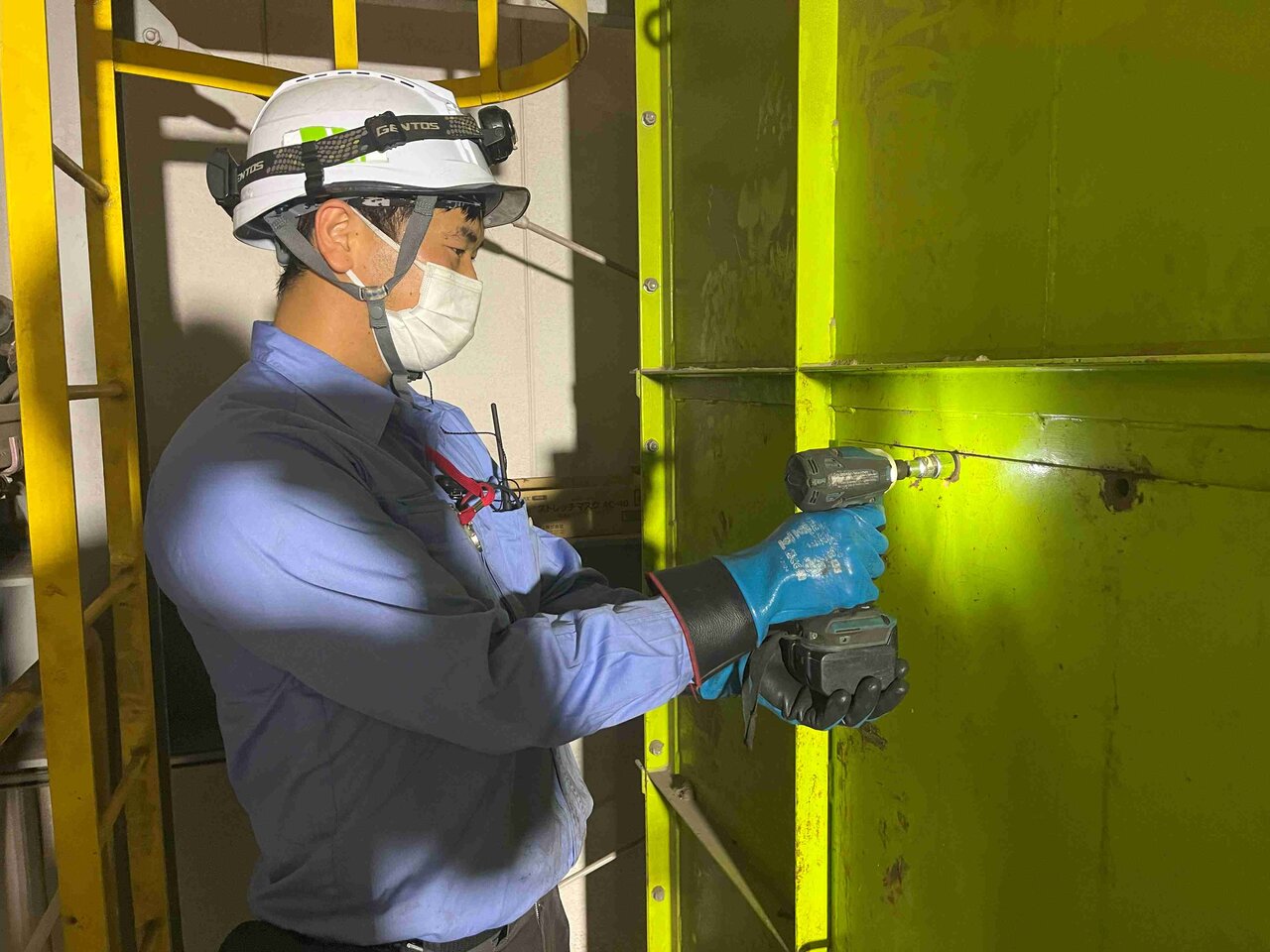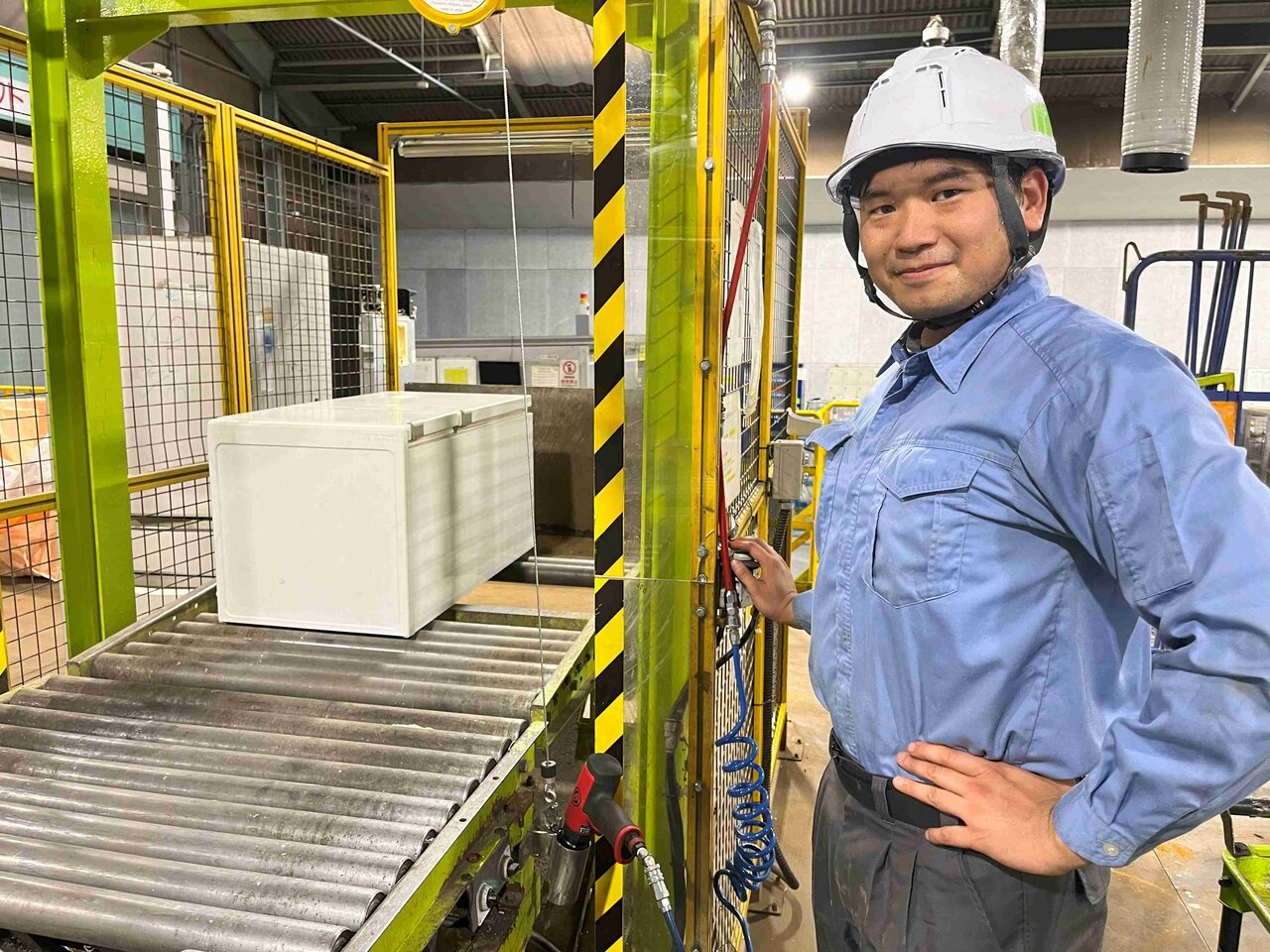Insights that transform the workplace – At the forefront of home appliance recycling
Keisuke Watanabe
Resource Recycling Dept., Mechanical Processing and Maintenance Group and Pre-processing Group , Chubu Eco Technology Corporation
Resource Recycling Dept., Mechanical Processing and Maintenance Group and Pre-processing Group , Chubu Eco Technology Corporation
Seeking improvements from a field perspective
At Chubu Eco Technology (Yokkaichi City, Mie Prefecture), part of the Mitsubishi Materials Group, we contribute to building a circular economy through home appliance recycling. We dismantle and process used televisions, air conditioners, refrigerators, and washing machines, recovering and recycling materials such as iron, copper, aluminum, and plastics. Recycling limited resources without waste is at the very core of our work. Since joining the company, I have been involved in managing the pre-processing stage of the home appliance dismantling line and supervising workers, always mindful of how to create a safer and more efficient work environment.
Recycling sites include many processes that place great physical demands on workers. They may have to lift heavy home appliances, use tools to remove small parts, or work in dusty or noisy environments. In such environments, I believe that reducing the burden on workers, even slightly, and enabling them to work with peace of mind ultimately leads to improved quality and speed. For this reason, I constantly look for ideas for improvement based on observations in the field, asking myself, "Can this task be made easier?" or "Is this process safe?"
Recycling sites include many processes that place great physical demands on workers. They may have to lift heavy home appliances, use tools to remove small parts, or work in dusty or noisy environments. In such environments, I believe that reducing the burden on workers, even slightly, and enabling them to work with peace of mind ultimately leads to improved quality and speed. For this reason, I constantly look for ideas for improvement based on observations in the field, asking myself, "Can this task be made easier?" or "Is this process safe?"
How a challenge led to both ease of work and efficiency
The reason I came to think this way was largely due to an equipment upgrade for the pre-processing stage that I was involved in during my second year at the company. At the time, I was in charge of managing the refrigerator line. Refrigerators are particularly heavy among the home appliances we handle. In particular, removing the vacuum insulation material inside the refrigerator walls required laying the refrigerator on its side, peeling off the wall, and then standing it up again, which was a physically demanding process for the workers. In addition, the work efficiency was not sufficient, and I felt there was a lot of room for improvement.
To improve this situation, we developed equipment that automatically removes vacuum insulation material. We went through repeated trial and error to enable automatic removal, adjusting the equipment's blade angle, the cutting depth, and settings for different materials. We spent many days exploring the optimal specifications, considering the application of commercially available tools and cost factors. At first, I had no knowledge of machinery, but by working closely with my supervisor, I gained the necessary skills and together we created equipment that was tailored to the site.
Although there were many things that did not go as expected in the early stages, we made repeated adjustments in cooperation with on-site colleagues. Ultimately, the equipment was completed, significantly reducing the burden on workers and improving both safety and work speed.
Through this experience, I realized that improving equipment is not just about efficiency—it is also about protecting the safety and health of those working on-site. I also strongly felt that such efforts ultimately enhance the quality and quantity of recycling, leading to the realization of a sustainable society.
To improve this situation, we developed equipment that automatically removes vacuum insulation material. We went through repeated trial and error to enable automatic removal, adjusting the equipment's blade angle, the cutting depth, and settings for different materials. We spent many days exploring the optimal specifications, considering the application of commercially available tools and cost factors. At first, I had no knowledge of machinery, but by working closely with my supervisor, I gained the necessary skills and together we created equipment that was tailored to the site.
Although there were many things that did not go as expected in the early stages, we made repeated adjustments in cooperation with on-site colleagues. Ultimately, the equipment was completed, significantly reducing the burden on workers and improving both safety and work speed.
Through this experience, I realized that improving equipment is not just about efficiency—it is also about protecting the safety and health of those working on-site. I also strongly felt that such efforts ultimately enhance the quality and quantity of recycling, leading to the realization of a sustainable society.
Looking beyond improvements toward a sustainable future
From the fiscal year ended March 2025, I was transferred to the Mechanical Processing Group. While continuing to work in the pre-processing stage, I am also taking on the challenge of a new field: equipment maintenance and upkeep. The work of the Mechanical Processing Group is different from what I have done before, and requires knowledge of machine structure and maintenance. Initially, I encountered many challenges, but I realized that stable equipment operation is directly linked to the safety and efficiency of the entire site, and I am working hard while learning every day.
Maintenance work also requires the ability to notice even the slightest changes, such as unusual sounds and vibrations. Previously, I would not have noticed signs of machine trouble, but now I can anticipate potential causes and respond accordingly, thinking, "This noise might be due to a loose belt" or "This vibration might indicate a misaligned shaft." These insights help prevent equipment failures on the pre-processing line and avoid work interruptions.
As I take on new responsibilities, I feel that "taking on a challenge" itself is the driving force behind making things better on-site. Taking a step forward in unfamiliar fields broadens my perspective and enhances the quality of the workplace. Currently, I am focusing on human resource development and standardizing work procedures, with the aim of creating an environment where everyone can work with confidence. Maintaining a workplace where people can work with peace of mind leads to recycling more home appliances, and I believe that these efforts, accumulated over time, will contribute to a sustainable future.
Maintenance work also requires the ability to notice even the slightest changes, such as unusual sounds and vibrations. Previously, I would not have noticed signs of machine trouble, but now I can anticipate potential causes and respond accordingly, thinking, "This noise might be due to a loose belt" or "This vibration might indicate a misaligned shaft." These insights help prevent equipment failures on the pre-processing line and avoid work interruptions.
As I take on new responsibilities, I feel that "taking on a challenge" itself is the driving force behind making things better on-site. Taking a step forward in unfamiliar fields broadens my perspective and enhances the quality of the workplace. Currently, I am focusing on human resource development and standardizing work procedures, with the aim of creating an environment where everyone can work with confidence. Maintaining a workplace where people can work with peace of mind leads to recycling more home appliances, and I believe that these efforts, accumulated over time, will contribute to a sustainable future.


"Resources are limited, so I want to recover and reuse as much as possible," says Watanabe. His greatest motivation lies in the spirit of challenge—taking on tasks no one has ever attempted before.













